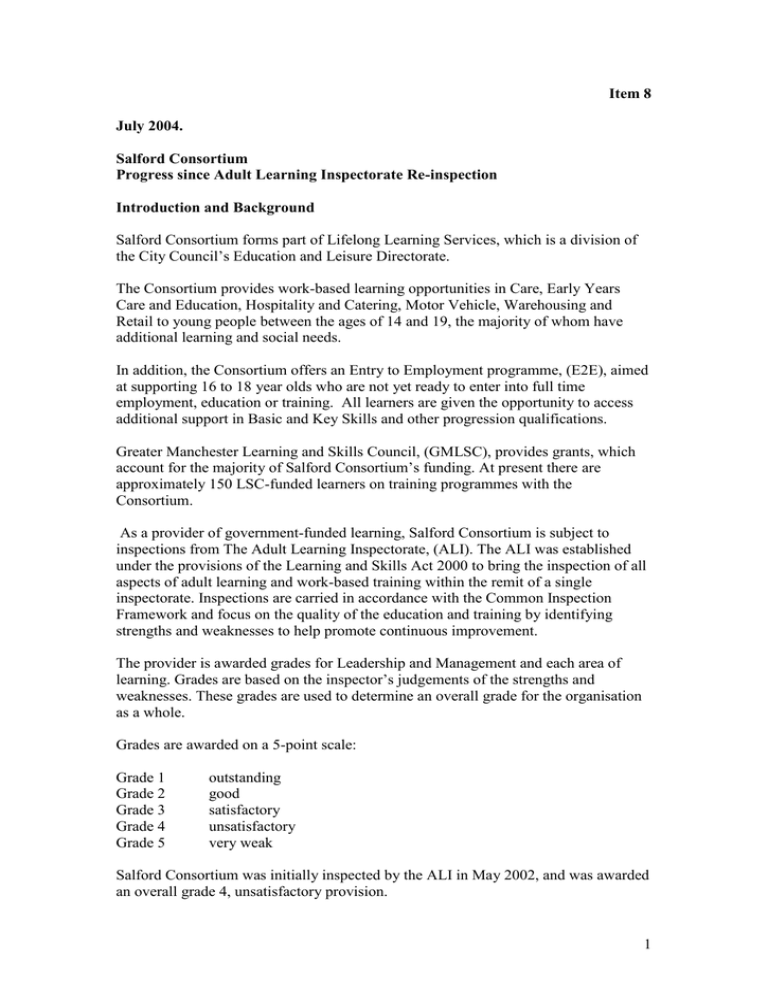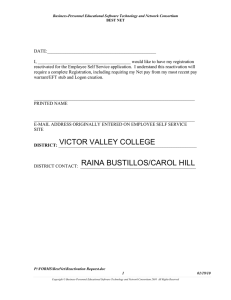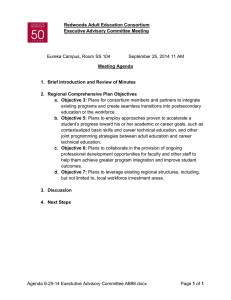Item 8 July 2004. Salford Consortium
advertisement

Item 8 July 2004. Salford Consortium Progress since Adult Learning Inspectorate Re-inspection Introduction and Background Salford Consortium forms part of Lifelong Learning Services, which is a division of the City Council’s Education and Leisure Directorate. The Consortium provides work-based learning opportunities in Care, Early Years Care and Education, Hospitality and Catering, Motor Vehicle, Warehousing and Retail to young people between the ages of 14 and 19, the majority of whom have additional learning and social needs. In addition, the Consortium offers an Entry to Employment programme, (E2E), aimed at supporting 16 to 18 year olds who are not yet ready to enter into full time employment, education or training. All learners are given the opportunity to access additional support in Basic and Key Skills and other progression qualifications. Greater Manchester Learning and Skills Council, (GMLSC), provides grants, which account for the majority of Salford Consortium’s funding. At present there are approximately 150 LSC-funded learners on training programmes with the Consortium. As a provider of government-funded learning, Salford Consortium is subject to inspections from The Adult Learning Inspectorate, (ALI). The ALI was established under the provisions of the Learning and Skills Act 2000 to bring the inspection of all aspects of adult learning and work-based training within the remit of a single inspectorate. Inspections are carried in accordance with the Common Inspection Framework and focus on the quality of the education and training by identifying strengths and weaknesses to help promote continuous improvement. The provider is awarded grades for Leadership and Management and each area of learning. Grades are based on the inspector’s judgements of the strengths and weaknesses. These grades are used to determine an overall grade for the organisation as a whole. Grades are awarded on a 5-point scale: Grade 1 Grade 2 Grade 3 Grade 4 Grade 5 outstanding good satisfactory unsatisfactory very weak Salford Consortium was initially inspected by the ALI in May 2002, and was awarded an overall grade 4, unsatisfactory provision. 1 The Consortium was re-inspected between the period of February 2003 and June 2003, and was awarded a grade 3, satisfactory provision. The Re-inspection Report The re-inspection report highlighted the following key strengths and weaknesses: Key Strengths Very effective links with work-placement providers Very good support for learners Good response to learners’ social needs Particularly supportive workplace supervisors Extensive range of work placements Key Weaknesses Inadequate impact of quality assurance on training programmes Insufficient monitoring of equality of opportunity in work placements Ineffective monitoring of post-inspection development plans Poor achievement rates Developments since Re-inspection The Consortium has undergone a number of staffing changes since the re-inspection. The position of Training Manager was created and a successful applicant appointed in June 2003 with responsibility for the overseeing programme delivery and the day to day running of the Consortium. A new Vocational Training Manager was appointed in August 2003 with overall responsibility for strategic planning and development and quality assurance. The position of Team Leader for Learner Support was created and a successful applicant was appointed in April 2004 with responsibility for overseeing and improving the delivery of Foundation Programmes, (E2E and Basic/Key Skills sessions). Several new Training Officers have also been appointed to the Learner Support Team. The management and delivery Foundation programmes was judged as an area for development by ALI inspectors, and as a result GMLSC did not award the Consortium with an E2E contract at the beginning of the 2003/04 academic year. LSC confidence has been restored with the appointment of a new team and improvements in learner retention and achievement rates. The Consortium was awarded an E2E contract in January 2004. GMLSC has also recognised the progress made in improving quality assurance procedures by moving the Consortium out of the ‘Serious Concerns’ risk banding for LSC Provider Performance Review, and 2 increasing the 2003/04 contract value for mainstream vocational provision from £426,000 to £780,000. The Consortium has undergone three Financial Assurance Audits since ALI Reinspection, two by GMLSC and one internal audit by Salford City Council. Both organisations awarded the Consortium a ‘satisfactory’ grade for use of funds, (an improvement on the ‘unsatisfactory’ grade previously awarded). The auditors identified that there was a requirement to improve internal control mechanisms. New systems and procedures have been implemented to address the areas of concern. The findings of the Consortium’s internal audits indicate that systems and procedures are now satisfactory. The Vocational Training Manager has worked with the team to draw up and agree a shared development plan that prioritises areas for improvement. The key focuses for the last 12 months have been: To implement a revised quality assurance framework that is recognised, understood and followed by all team members To implement a strategy for retention and achievement To promote a positive culture of self-assessment throughout all areas of the organisation To improve management information systems to ensure accuracy of data for benchmarking, target setting and reviewing progress To encourage better team working and sharing of information The Training Manager has supported the staff on a day-to-day basis to implement revised practices and procedures, and to achieve the goals and objectives stated in the development plan. Progress against the development plan is regularly monitored at both management and staff meetings. Key success measures have been agreed to determine the impact of the implementation of the development plan. Performance against the impact measures is reviewed and evaluated on a quarterly basis through the analysis of data, customer feedback and the findings of internal monitoring and auditing activities. This informs further development planning and targets for improvement. The implementation of the Retention and Achievement Strategy has resulted in improved retention and achievement rates. Significant improvements have been made to the selection and initial assessment procedures to ensure learners are directed to the most suitable programme to meet their needs. An ‘At Risk Register’ is maintained an updated for each programme area. Those learners most at risk of leaving are identified and receive additional support from the Retention Officer to ensure that every effort is made to retain them on programme. Retention data is currently being updated for 2003/04. Indications are that retention rates have improved by at least 10% on 2002/03. Conclusion 3 Salford Consortium experienced a great deal of change both prior to, and during ALI Re-inspection. This resulted in uncertainty and confusion amongst the team and inconsistent standards of service delivery. A great deal of progress has been made, but there is still a requirement for improvement: Inadequate impact of quality assurance on training programmes A quality assurance framework is now in place. There are indications that the new procedures are having a positive impact on the learning experience, but procedures are still in the process of being embedded. Insufficient monitoring of equality of opportunity in work placements Equality and diversity issues are regularly discussed with learners and work placements, however, there are inconsistencies in level of employer involvement in the learners’ training programmes, and the recording and reviewing equality of opportunity issues could be improved. An external consultancy is currently working with the team to address these issues. Ineffective monitoring of post-inspection development plans Progress against post-inspection development plans is now regularly monitored and reviewed. There is evidence to demonstrate that the key strengths have been maintained and that progress has been made to address the weaknesses, but there is still a requirement to fully embed revised systems, practices and procedures. Poor achievement rates There are strong indications that achievement rates are improving. GMLSC set an achievement rate target of 35% for the 2003/04 academic-year, (a 15% increase on 2002/03). The final figures for 2003/04 will not be available until August 2004, but data available at the end of May 2004 indicated that the anticipated achievement rate for 2003/04 will be 40%. This demonstrates a significant improvement on previous years, but the Consortium recognises that a 40% achievement rate is still relatively low, and has set challenging targets to improve the achievement rate of learners to 60% by 2005/06. The activities of the last 12 months have focused on providing clear leadership and direction to standardise and improve the quality of service standards, and to lay firm foundations to support the continued growth and improvement of the organisation. The Consortium feels this has been achieved and is now in a strong position to continue to build on these achievements and move forward. 4 5




